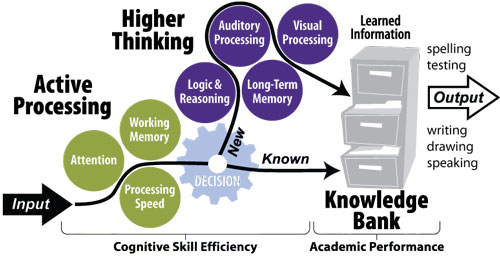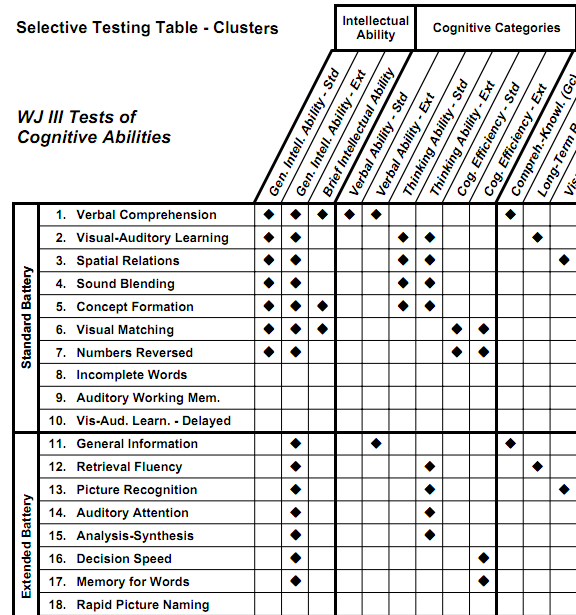10 Proven Ways the Body can Boost the Brain
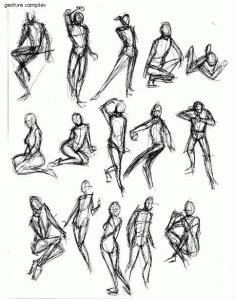 How we use our bodies influences brain function and cognitive performance. Walking around to think out problems, gesturing with your hands to articulate a a complex point, smiling to feel happy, playing catch for a study break to enhance learning, taking a nap to supercharge problem solving and many other simple behaviors have scientific backing.
How we use our bodies influences brain function and cognitive performance. Walking around to think out problems, gesturing with your hands to articulate a a complex point, smiling to feel happy, playing catch for a study break to enhance learning, taking a nap to supercharge problem solving and many other simple behaviors have scientific backing.
Found a post on the PsyBlog, 10 Simple Postures That Boost Performance, that summarizes this effect well. The author tells you specifically what to do, why it works and then in some cases provides a link to a scientific study that backs it up.
This is a great way to get started in using your body to boost your brain. Don’t expect instant results. It takes some time and practice. You may want to read the supporting articles to get the details.
Very interested to hear from readers that use simple body-based techniques to improve cognitive performance.
Image Source: Blazedent
Categories: Lifestyle, Memory and Learning, Problem Solving Tags: embodied cognition
Popularity of Smart Drugs – See the Movie
 A wide variety of pills and drugs promise to improve brain function or help us achieve peak cognitive performance. Called cognitive enhancers, smart pills or nootropics they reportedly improve mental energy and focus, memory or creativity through altered states. They include drugs such as cannabis and hallucinogens as well as off-prescription use of medications especially those used for attention-deficit disorders such as Adderall.
A wide variety of pills and drugs promise to improve brain function or help us achieve peak cognitive performance. Called cognitive enhancers, smart pills or nootropics they reportedly improve mental energy and focus, memory or creativity through altered states. They include drugs such as cannabis and hallucinogens as well as off-prescription use of medications especially those used for attention-deficit disorders such as Adderall.
The use of smart drugs appears wide spread in colleges and the professions. Their short term and long-term impact on those seeking higher cognitive performance has not been studied. Smart pills are so popular they even star in movies. Just released, the movie Limitless stars a smart pill to access the other 90% of your brain. It transforms your life. But there is a catch.
Interested to hear from readers that use smart pills to enhance brain function or cognitive performance. What do you take, how much and how does it work?
Categories: Memory and Learning, Mental Focus Tags: mental energy, smart drugs
Evidence Mounts – Caffeine & Sugar Boost Cognitive Performance
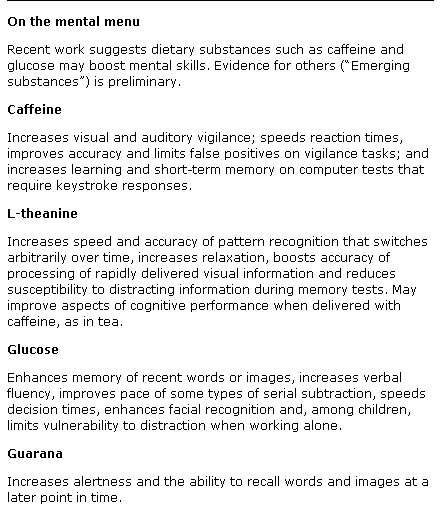 Science News just published an easy to read review article on what the latest scientific studies reveal about nutritional supplements and brain function. The evidence that certain supplements are brain boosters is really mounting. The “mental menu” shown to the right is taken directly from the article.
Science News just published an easy to read review article on what the latest scientific studies reveal about nutritional supplements and brain function. The evidence that certain supplements are brain boosters is really mounting. The “mental menu” shown to the right is taken directly from the article.
This means for example, a snack including caffeinated tea and a sugary treat should produce a short-lived but intense boost in mental energy and cognitive performance.
Categories: Diet, Executive Function, Memory and Learning, Mental Focus Tags:
How to Get Two More Years of Brain Health
 Here on the Next Brain Blog I have posted several times on the value of taking a walk for stimulating thinking, lowering stress and forestalling the effects of age-related cognitive decline. Even small amounts of walking can produce dramatic results. For example, check out the new research from University of Illinois at Urbana-Champaign that found:
Here on the Next Brain Blog I have posted several times on the value of taking a walk for stimulating thinking, lowering stress and forestalling the effects of age-related cognitive decline. Even small amounts of walking can produce dramatic results. For example, check out the new research from University of Illinois at Urbana-Champaign that found:
Walking 40 minutes three times a week on a regular basis increases the size of your hippocampus (area of brain where memories form) and effectively slows normal cognitive decline by two years in adults ages 50 to 80 years.
This is a powerful finding because normally our hippocampus decreases in volume 1-2% per year as we age.
Categories: Cognitive Decline, Lifestyle, Memory and Learning, Older Adult Tags: exercise
LearningRx – A Brain Training Center Near You
A reader shared an experience they had with LearningRx a consumer center for brain training. They promise to improve your academic performance by providing coached training on a full range of cognitive skills (see diagram).
The process starts with a formal assessment using the Woodcock-Johnson assessment for cognitive abilities (partially shown below).
You are then matched with a coach and work 3-5 days per week for an hour a day for 3 months. They claim a 3.6 year improvement on the cognitive assessment and have some studies to back it up.
LearningRx has centers across the US and they want to open more using a franchise approach. Interested to hear from other readers that have used this service.
Categories: Child, Cognitive Development, College Student, Memory and Learning, Mental Focus, Perception, Training Tags: brain training
Can Specific Scents Boost Cognitive Performance?
 Scents and odors have a swift and powerful impact on our brains. They can trigger memories and moods and signal the intentions and feelings of others. But can specific scents be used to improve our brain function and cognitive performance?
Scents and odors have a swift and powerful impact on our brains. They can trigger memories and moods and signal the intentions and feelings of others. But can specific scents be used to improve our brain function and cognitive performance?
There are scientific studies that suggest the scent of vanilla, cinnamon, roses and peppermint impact attention, memory and mental energy.
For example, a recent study in the North American Journal of Psychology pointed out:
“Past research indicates the odors of peppermint and cinnamon (1) enhance motivation, performance, and alertness, (2) decrease fatigue, and (3) serve as central nervous system stimulants.”
I could not find many scientific studies. The impacts they measure are not large or sustained.
There are also some suggested uses of odor in brain training, especially in the approach called neurobics. For example, in the book Keeping Your Brain Alive, the authors suggest:
- Wake up and smell the vanilla: Release the smell of an extract (vanilla, citrus, peppermint or rosemary) just as you awake every morning for a week.
- The scent of music: Sniff specific odors while listening to a song to stimulate novel sensory associations in your brain.
Scent can be delivered from simple cotton balls, plug-in devices, sprays or oils spread by small fans in low-cost electric aromatherapy diffusers. This makes it relatively easy to experiment with scents and cognitive performance. For example, scenting a room while studying, taking sniffs of specific scents just before or after a mental task and so on.
Interested to hear from readers that use scent to boost performance or as part of a brain training routine.
Categories: Memory and Learning, Mental Focus, Other Tags: scents
Action Video Games Work Mental Muscles Big Time
 Multiple experiments done by Daphne Bavelier, professor of brain and cognitive sciences and her group at the University of Rochester, strongly suggest that action video games improve perception (speed and accuracy), attention (including multi-tasking), decision-making and other aspects of cognition.
Multiple experiments done by Daphne Bavelier, professor of brain and cognitive sciences and her group at the University of Rochester, strongly suggest that action video games improve perception (speed and accuracy), attention (including multi-tasking), decision-making and other aspects of cognition.
That is an amazing workout for the brain especially if you are getting it by having fun. The key is to play a game that is first-person and includes a lots of action or visual-motor coordination. My favorites are Geometry Wars and Soul Caliber 4.
Interested to hear from readers that play action video games. Which games do your play? Can you feel them working your mental muscles?
Categories: Decision Making, Memory and Learning, Mental Focus, Perception, Software Tags: brain training, games
Warming Up Your Brain Improves Performance
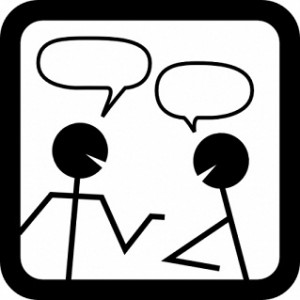 Want to improve your ability to solve a problem, take a test, deliver a presentation or perform some other cognitive task? Make sure you stimulate your brain by having a friendly social conversation before taking on the task. According to researchers at the University of Michigan, this friendly-chat brain boosting technique works well because:
Want to improve your ability to solve a problem, take a test, deliver a presentation or perform some other cognitive task? Make sure you stimulate your brain by having a friendly social conversation before taking on the task. According to researchers at the University of Michigan, this friendly-chat brain boosting technique works well because:
“… some social interactions induce people to try to read others’ minds and take their perspectives on things,” Ybarra said.”
A 10-minute “get to know you” conversation produces the effect. The researchers warn that the effect does not work if the conversation has a competitive tone.
Interested to hear from readers on what else we can do to “warm up” our brains before a cognitive performance.
Categories: Lifestyle, Memory and Learning, Problem Solving Tags:
Small Direct Current Boosts Brain Function
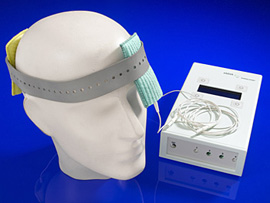 A recent study conducted at Oxford University on the use of transcranial direct current stimulation (tDCS) to improve math skills is getting considerable attention. A small group of college students received a tiny direct current to the parietal lobe for 20 minutes per day for six days. They showed a significant improvement in numerical ability (representation of artificial numeric symbols) that persisted for as long as six months.
A recent study conducted at Oxford University on the use of transcranial direct current stimulation (tDCS) to improve math skills is getting considerable attention. A small group of college students received a tiny direct current to the parietal lobe for 20 minutes per day for six days. They showed a significant improvement in numerical ability (representation of artificial numeric symbols) that persisted for as long as six months.
I have seen other studies that claim tDCS can improve creativity, declarative memory, visual memory, motor skills and pain relief as well as speed stroke recovery.
I am not aware of any devices and training protocols available to the general public. Interested to hear from readers that use tDCS.
Categories: Memory and Learning, Sleep Tags:
Jump Two Reading Grade Levels in 8 Weeks
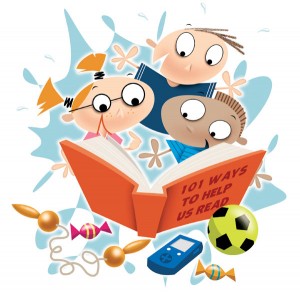 I receive emails from parents asking about brain training for their children. Improving kid’s brain function and cognitive performance, especially in school is a very active area. It is covered regularly on the Next Brain Blog. You can check out what has already been posted by going to the categories pull down menu (to the right) and selecting Child or Student under the Life Stage or Vocation category.
I receive emails from parents asking about brain training for their children. Improving kid’s brain function and cognitive performance, especially in school is a very active area. It is covered regularly on the Next Brain Blog. You can check out what has already been posted by going to the categories pull down menu (to the right) and selecting Child or Student under the Life Stage or Vocation category.
One of the most exciting and scientifically robust options parents have for boosting the brain power of their children are the products provided by Scientific Learning (I have no affiliation). They apply brain fitness techniques to improve reading and language comprehension skills in K-12. They have good evidence to claim that they can:
Improve the reading level of students by two grades even if the student is already performing at an advanced level.
Parents can rent the program here for about $200.
Interested to hear from readers that have experience with brain fitness products from Scientific Learning.
Categories: Child, Memory and Learning, Software Tags: speed reading


